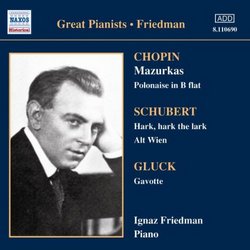| All Artists: Ignaz Friedman Title: Ignaz Friedman: Complete Recordings, Vol. 3 Members Wishing: 0 Total Copies: 0 Label: Naxos Original Release Date: 1/1/2028 Re-Release Date: 2/18/2003 Genres: Dance & Electronic, Special Interest, Classical Styles: Chamber Music, Historical Periods, Classical (c.1770-1830), Modern, 20th, & 21st Century Number of Discs: 1 SwapaCD Credits: 1 UPC: 636943169025 |
Search - Ignaz Friedman :: Ignaz Friedman: Complete Recordings, Vol. 3
 | Ignaz Friedman Ignaz Friedman: Complete Recordings, Vol. 3 Genres: Dance & Electronic, Special Interest, Classical |
Larger Image |
CD Details |
CD ReviewsThe best Mazurkas before Rubinstein's first set Anton Zimmerling | Moscow, Russia | 12/07/2008 (5 out of 5 stars) "Volume 3 in the Naxos Friedman series is mainly devoted to Chopin and offers reissues of English Columbias 1928-1930. It contains 12 Mazurkas in an excellent sound. It is a more passionate reading than Rubinstein's first set (1938-9). Friedman takes these pieces just as seriously as Rubinstein and offers a more dramatic reading: the overall contrast between pp and ff is very big. He plays the Mazurkas as great music, not as music for the drawing room. The B flat minor Mazurka Op. 24.4. and the B minor Mazurka Op. 33.4 are stunning: here you get real, not fake fortissimos in the turning points, and they sound appropriate. In one case (Op. 41. 1) two different takes made in 1929 and 1930 are provided.
Even Friedman needed time to adjust to the recording conditions. All 12 Mazurkas approved by him and commercially issued in 1930 are treasures, but they come from a very strenuous recording process, some of them after 7-8 rejected takes. There are some survived alternative takes and earlier versions, and all of them are weaker, to my mind. The so called 9th Polonaise in B flat major, Op. 71/2 (1929) was reportedly a favorite of Theodore Leschetizky, Friedman's and Moiseiwitsch's teacher. There is a contemporary recording of Moiseiwitsch, and it is better: Friedman is playing tricks with agogics and destroying the rhythm. Friedman's method of rubato may be studied on his own Schubert arrangement `Alt Wien' (1928): the opening section is his alternative to Liszt's well-known transcription of Schubert's Valse-Caprice No. 6. Friedman tended not to speeding up in the culmination, but to slowing down and dragging the rhythm before the culmination. Frankly, I don't like Friedman's piece and prefer Liszt's version. An appendix from a 1940 New Zealand broadcast features Friedman speaking on Chopin. This fragment is interesting, though the pianist's opinions about Chopin were apparently more mainstream and balanced than his own playing method. Highly recommended. I also recommend the last volume of this series: it contains probably the best Friedman's Chopin recording - that of the E flat Nocturne Op. 55 No. 2 (1936). " |
